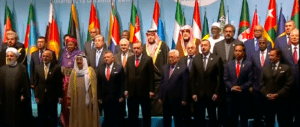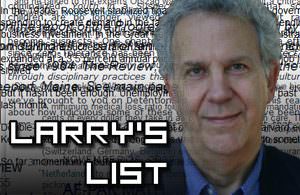Bet on Trump or Challenge Israel? Palestinians Mull Strategy
After more than two decades, Palestinians are increasingly questioning their leaders’ policy of reaching statehood through negotiations with Israel. Shutterstock
Shutterstock
RAMALLAH, West Bank — After more than two decades of failures, Palestinians are increasingly questioning their leaders’ strategy of reaching statehood through negotiations with Israel.
A majority believes that the “two-state solution” to the Israeli-Palestinian conflict is no longer possible, despite pledges by President Donald Trump that he would try to broker a deal and a new round of Mideast meetings on the sidelines of the U.N. General Assembly this week.
Such skepticism largely stems from continued Israeli settlement in the West Bank and east Jerusalem, which some believe has passed the point of no return. Prime Minister Benjamin Netanyahu, who in the past said he does not want to rule the Palestinians, recently declared that Israel cannot give up control over the West Bank.
Three senior Palestinian officials and a leading pollster explored Palestinian options.
___
HOW DID WE GET HERE?
Since 2000, there have been two unsuccessful high-level U.S.-led efforts to broker a final deal on borders between Israel and a state of Palestine, roughly comprising the West Bank, Gaza Strip and east Jerusalem, lands Israel captured in 1967.
Each time, the sides were unable to close gaps. Israel accused the Palestinians of turning down generous offers. Palestinians note the territories they seek make up less than a quarter of historic Palestine.
Israel kept building settlements, with some 600,000 Israelis now living on war-won lands, while Palestinian militants tried to derail talks through deadly attacks on civilians and soldiers.
A Palestinian political split in 2007, with the militant Hamas group seizing Gaza, further undermined the process. Palestinians also complained of lack of leverage in negotiating with their occupiers whose strategic ally, the United States, is sole mediator.
___
ABBAS’ RISK AVERSION
Palestinian President Mahmoud Abbas also bears responsibility for the deadlock because he has been unwilling to challenge Israel and the U.S., said pollster Khalil Shikaki.
He said it relates to Abbas’ conflicting roles as both head of a national movement that seeks to end Israeli occupation and as leader of an autonomy government dependent on foreign aid and Israeli acquiescence to provide services to millions.
Shikaki argued Abbas has been too invested in the status quo and should push harder to translate the General Assembly’s 2012 recognition of Palestine along pre-1967 lines into achievements on the ground.
For example, Abbas could make a statement by issuing passports emblazoned with “State of Palestine” in place of the current “Palestinian Authority,” Shikaki said.
“What we need is to give ourselves the ability to free our decision-making from these constraints and be in a position to take risks. This is not where the Palestinian Authority is today,” he said. “So our leadership lacks credibility, in the eyes of its own public, in the eyes of the Israelis and in the eyes of the international community.”
A new survey by Shikaki’s Palestinian Center for Policy and Survey Research found that 67 percent of Palestinians want Abbas to resign, up 5 points from June. The poll, which had an error margin of 3 percentage points, also found 52 percent still support a two-state option, but 57 percent believe it’s no longer possible because of Israel’s settlements.
Abbas has been silencing dissent, drawing criticism that he is mainly focused on staying in power.
Political debate has been stifled by the erosion of institutions, such as parliament, after the 2007 split with Hamas-ruled Gaza. Shikaki said Abbas has become sole decision-maker, leaving other figures as “cheerleaders, rather than critics.”
___
BETTING ON TRUMP?
President Donald Trump exuded optimism early on, promising the “ultimate” Mideast deal without providing contours or a plan to restart negotiations.
On Wednesday, ahead of a meeting with Abbas, Trump said there is a “pretty good shot” he can broker a deal, but was again short on specifics.
In his speech to the General Assembly, Abbas accused Israel of “flagrant disregard for the two-state solution” and warned that Palestinians would be compelled to review the entire peace process, but stopped short of saying he would abandon it. In addressing the plenum earlier this week, Netanyahu referred only briefly to the conflict, saying that “Israel is committed to achieving peace with all its Arab neighbors, including the Palestinians.”
Abbas has courted Trump and projected willingness to engage with Israel, dropping a long-standing condition that Israel must significantly curb settlement building before talks resume.
Nabil Shaath, an Abbas adviser, said Palestinian expectations have been dampened by Trump envoys telling them recently that they need another three or four months to come up with a plan.
Mohammed Ishtayyeh, a former negotiator, said it’s pointless for the Palestinians to engage in U.S.-led negotiations as long as Trump can’t rein in Israel on settlements.
Ishtayyeh said the only hope is with new talks mediated not by the U.S. but a consortium of global powers. But there is no clear path to getting Israel, or the U.S., to accept such a formula.
Shikaki warned that damage to the two-state option caused by settlements could be “massive” by the end of Trump’s term, an outcome inadvertently enabled by Abbas’ sticking to the status quo.
__
A BINATIONAL STATE?
Veteran negotiator Saeb Erekat said Abbas was to date right to stick to a mix of negotiations, rejecting violence and seeking international recognition for Palestine.
He accused Netanyahu of trying to destroy the possibility of a two-state solution by tightening Israel’s grip on occupied lands. But he said that the Palestinians will never accept Israeli rule and the international community “doesn’t have the stomach” for what would become an apartheid system.
He said he hopes Israelis will eventually realize that Palestinian statehood is the best option for both peoples. If they don’t, Palestinians can always shift strategy and fight for equal rights in a bi-national state.
“I cannot specify the date (of such a shift), but I think those in Israel who are destroying the two-state solution must realize this will be the outcome,” he said.
Such a state would have, by the current numbers, a population of about 13 million equally divided between Jews and Palestinians.
It’s a scenario most Israelis reject as the end of the Zionist dream, while Israeli supporters of the status quo hope it can somehow remain in effect without giving the Palestinians in the occupied lands citizen rights.
Your support matters…Independent journalism is under threat and overshadowed by heavily funded mainstream media.
You can help level the playing field. Become a member.
Your tax-deductible contribution keeps us digging beneath the headlines to give you thought-provoking, investigative reporting and analysis that unearths what's really happening- without compromise.
Give today to support our courageous, independent journalists.



You need to be a supporter to comment.
There are currently no responses to this article.
Be the first to respond.